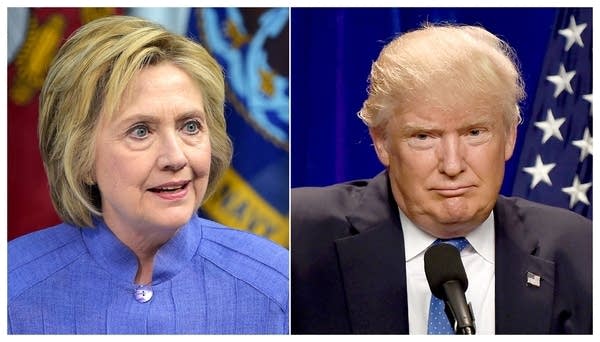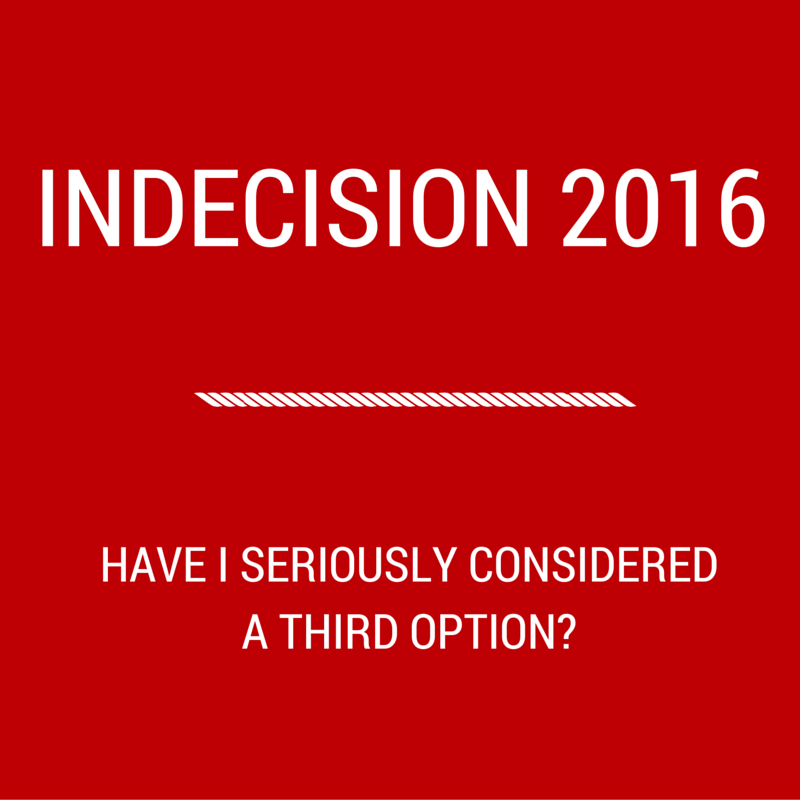Indecision 2016: 10 questions to ask if you're Never Trump but also Not With Her

Go Deeper.
Create an account or log in to save stories.
Like this?
Thanks for liking this story! We have added it to a list of your favorite stories.
The billionaire businessman and former secretary of state are two of the most unpopular major party candidates on record, even within their own parties.
"Never Trump" conservative activists (and even some prominent Republicans) tried to deny Trump the 1,237 delegates he needed to clinch the GOP nomination, but ultimately failed. Texas Sen. Ted Cruz caused a stir when he spoke at the Republican National Convention told Americans to "vote your conscience" instead of throwing his support behind the party's nominee.
Meanwhile, Clinton is struggling to win over staunch Bernie Sanders supporters, even after her former rival endorsed her. The start of the Democratic National Convention was marked by acrimony, as protesters and Sanders supporters disrupted the proceedings. The furor was fueled in part by a leak of some internal DNC emails that were critical of Sanders' campaign. The revelations led to DNC Chair Debbie Wasserman Schultz's resignation.
All of this has led many voters — from true-blue liberals to stalwart conservatives — to consider switching sides.
Turn Up Your Support
MPR News helps you turn down the noise and build shared understanding. Turn up your support for this public resource and keep trusted journalism accessible to all.
If you haven't yet made up your mind — and frankly, aren't quite sure where to start — ask yourself these 10 questions to help guide you as we count down to Election Day.

First things first: Whatever you do, do not ask yourself which candidate you like better. In fact, disregard the question entirely.
"This is not an election of who you like," says Larry Jacobs, a political scientist at the University of Minnesota. "This is really a basic election of the direction of the country." (More on that later)
Instead, set aside your personal feelings and focus on what each candidate is saying or proposing and what they might sign or veto.
"Your personal aversion to the particular way a person carries himself — or his or her manners — is less important than issues about honesty, integrity and whether the person is likely to carry out policies about positions that are of fundamental human importance," says Michael Winter, a philosophy professor at the University of St. Thomas. "I think that's the thing to stay focused on."

One way to keep emotional distance is to turn off the TV. Instead, read the speech, debate or interview transcripts, says Washington Post advice columnist Carolyn Hax.
That way, you can cut through all the noise and just get to the facts (see above).

Don't get caught up in superficial issues like how a person looks, how many times they've been married, etc.
"In ethics, we start usually with issues that pertain to human life and human freedoms," says Winter, the St. Thomas professor. "Those are the fundamental issues."
That means looking at things like a candidate's stance on abortion; health care; end-of-life issues; treatment of the poor; war and terrorism. How do your values align?

Each candidate presents very different paths for the country's future, says Jacobs: "This is not the usual partisan squabbling over differences with regards to the amount of spending or taxation. This is really about qualitatively different directions the country should move in."
Voters must decide who and what they think is "going to put us on the best path for security and prosperity," he says.
Here's a comparison of Trump versus Clinton on major issues.

By now, you likely have a set of issues that are important to you. Are those issues the candidates also recognize as important causes?
For example, if health insurance is a major concern for you, do the candidates acknowledge that — and how it's a problem, rather than just rattling off (and repeating) talking points?

This means actual answers with real numbers behind them, and not just slogans or catchphrases.
"We're not infants. You can demand more of people than saying, 'Oh, you have a cold? I will cure your cold.' Well, how will you cure my cold?" says Randy Cohen, who used to write The Ethicist column for The New York Times Magazine. "The candidate should treat you like an adult and show that respect for you."

Look at whether the proposals are constitutional and within the bounds of the law.
But also pay attention to which candidate has the experience and knowledge to enact or push for change.
"Are they conversant with the most interesting ideas in their field? If you regard transportation policy as important, does the candidate seem up on transportation policy? Have they read a lot? Do they embrace complexity? Have they worked a lot with transportation policy?" Cohen aks.

In other words, have you looked at any "red flags" for why someone shouldn't get your vote?
For Cohen, they include things like lacking intellectual curiosity and telling deliberate lies.
"There's nothing unethical about making mistakes — we all make mistakes," he says. "But to be corrected (by a neutral third party) and to repeat what you then know to be a falsehood, you really don't get to be part of this process anymore."

Despite all the talk of Trump and Clinton, there are other candidates in the presidential race. Gary Johnson is running on the Libertarian ticket, while Jill Stein represents the Green Party.
Worried about spoiling the race if you go the third-party route? Don't let that affect your decision, says Winter.
"It's very difficult to predict outcomes of these sorts of decisions. We're dealing with complex issues here when talking about voter behavior. There are so many variables, it's difficult to predict how those things are going to play out," he says.
Also, never say candidate C (or D) can't win. Jesse Ventura, anyone?

So you've made it this far and still can't make up your mind?
Consider this from Jacobs: Too much is at stake, particularly this year (see above: "...direction of the country"). The decision of American voters affects the entire world "because of the unparalleled influence of the president. That influence has increased as presidents have acted unilaterally more often."
"Choices are always complicated," he continues. "But the difficult work of being a citizen and coming to a decision remains. You don't simply get to opt out of it because it's hard."
As for whether it's morally wrong or unethical to skip out on Election Day? Winter, who specializes in ethics, says he wouldn't denounce someone who decided not to cast a ballot. He believes our moral obligations and civic duties are more about being involved and "doing what we can to try to effect change, make change and make our community better."



